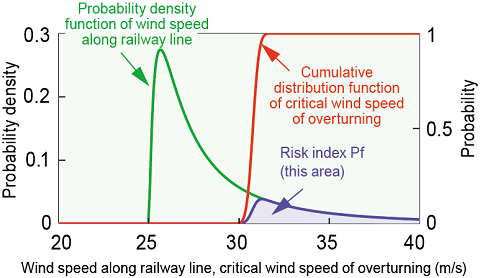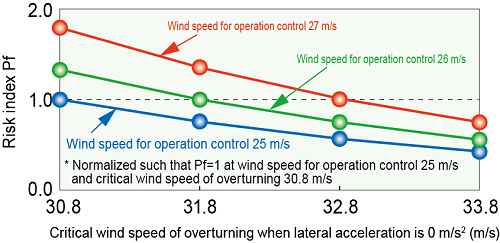4. Method for evaluating vehicle safety in strong winds using probabilistic risk assessment
In recent years, as meteorological disasters have become increasingly severe, making railway services more resilient against strong wind disasters has become an urgent challenge.
At the same time, tougher regulations relating to strong winds can lead to less stable and convenient transportation.
In light of this, we introduced a probabilistic risk assessment method to the safety evaluation of vehicles operating under strong wind conditions and proposed a safety assessment method for preventing trains from overturning and for maintaining stable transportation services.
The lateral acceleration used for calculating the critical wind speed of overturning, which represents the overturning resistance of a vehicle to strong wind, is not constant; it varies depending on travel conditions. The wind speed values of the natural wind, which represents the external force that overturns the vehicle, also have variability.
To assess the effects of the variation in the critical wind speed of overturning and wind speeds in windy conditions, each is expressed as a probability distribution (Fig. 1).
By applying the concept of failure probability, the probability of a wind speed exceeding the critical wind speed of overturning is determined and used as a risk index Pf to express the possibility of the vehicle overturning (Fig. 2).
This risk index can be used to determine appropriate wind speed for operation control for the type of vehicle and wind conditions along the railway line. For example, a safe wind speed for operation control can be specified based on the risk index value determined under conditions where no accidents have occurred in the past. When a new type of vehicle with a different critical wind speed of overturning is deployed, the wind speed for operation control can be flexibly modified to match the different critical wind speed of overturning using a uniform risk index for that section of railway line (Fig. 3).
Other Contents
- 1. Earthquake early warning method for the earthquake source fault regions
- 2. Design method for bearing parts to control damage and improve restorability
- 3. Method for verifying the restorability of railway structures considering small-and medium-scale earthquakes
- 4. Method for evaluating vehicle safety in strong winds using probabilistic risk assessment
- 5. Inspection of gaps by hammering slab track filling layers and prediction of deterioration
- 6. Method for estimating snow accretion and snow dropping of a train vehicle for investigating countermeasures against snow dropping
- 7. Method of applying image processing-based object detection and obstacle determination to safety applications
- 8. Support system for preventing a decline in alertness level of drivers
- 9. Phased array ultrasonic testing method for easy detection of flaws in bogie frame welds
- 10. Oil for axle-box for Shinkansen with excellent low-temperature performance and maintainability
- 11. Seat surfaces for minimizing injuries to passengers in the event of a collision
- 1. Earthquake early warning method for the earthquake source fault regions
- 2. Design method for bearing parts to control damage and improve restorability
- 3. Method for verifying the restorability of railway structures considering small-and medium-scale earthquakes
- 4. Method for evaluating vehicle safety in strong winds using probabilistic risk assessment
- 5. Inspection of gaps by hammering slab track filling layers and prediction of deterioration
- 6. Method for estimating snow accretion and snow dropping of a train vehicle for investigating countermeasures against snow dropping
- 7. Method of applying image processing-based object detection and obstacle determination to safety applications
- 8. Support system for preventing a decline in alertness level of drivers
- 9. Phased array ultrasonic testing method for easy detection of flaws in bogie frame welds
- 10. Oil for axle-box for Shinkansen with excellent low-temperature performance and maintainability
- 11. Seat surfaces for minimizing injuries to passengers in the event of a collision



